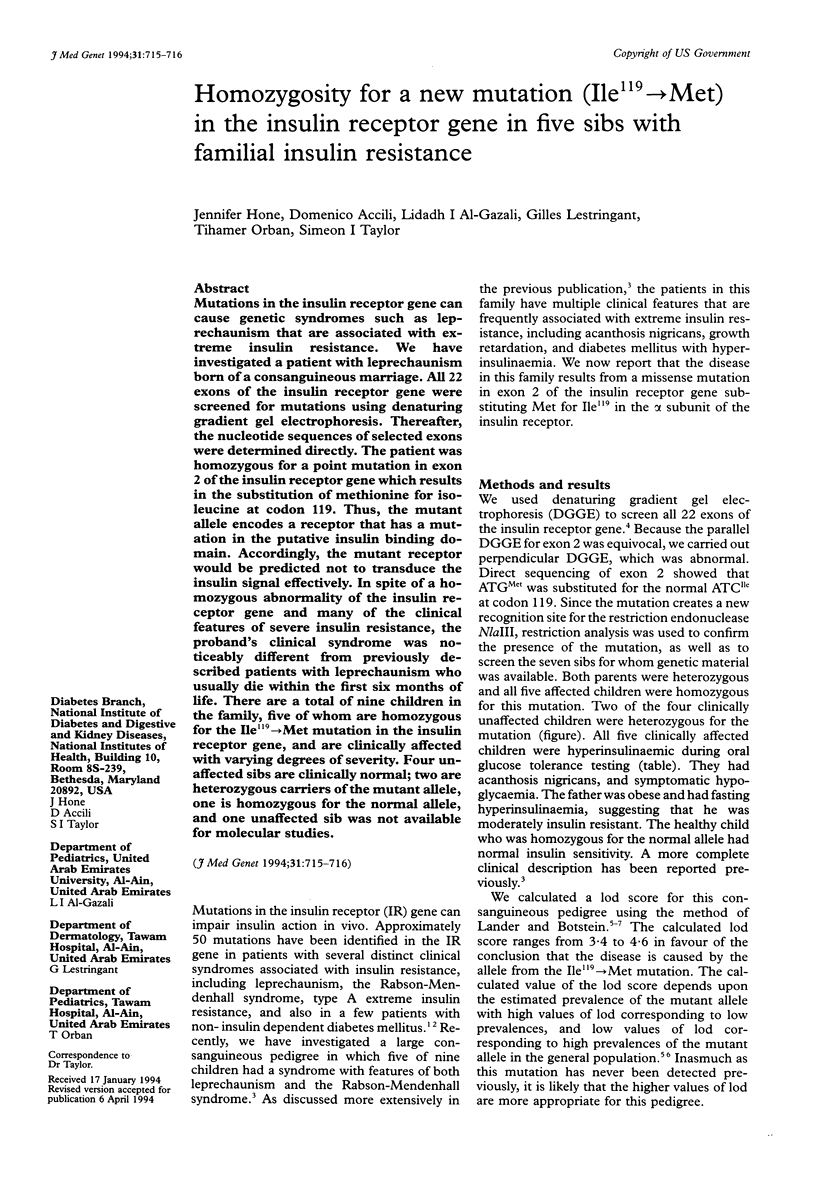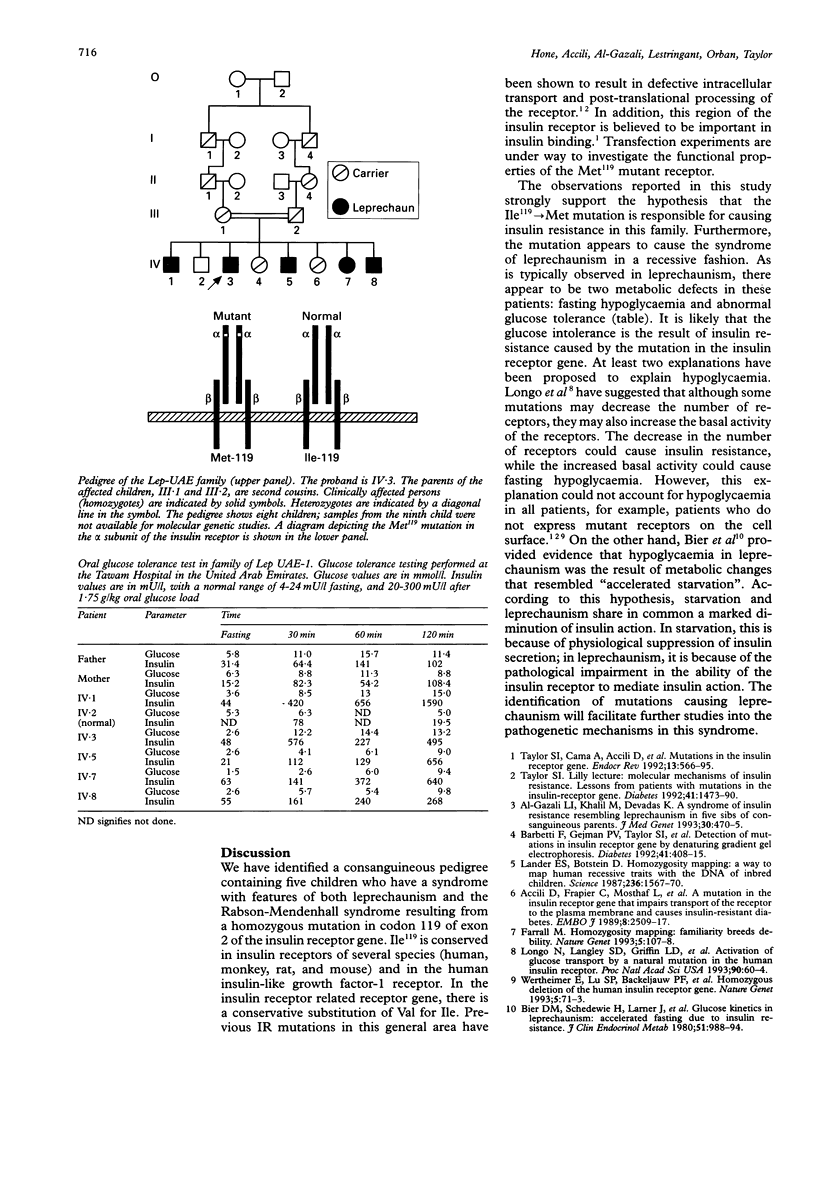Abstract
Mutations in the insulin receptor gene can cause genetic syndromes such as leprechaunism that are associated with extreme insulin resistance. We have investigated a patient with leprechaunism born of a consanguineous marriage. All 22 exons of the insulin receptor gene were screened for mutations using denaturing gradient gel electrophoresis. Thereafter, the nucleotide sequences of selected exons were determined directly. The patient was homozygous for a point mutation in exon 2 of the insulin receptor gene which results in the substitution of methionine for isoleucine at codon 119. Thus, the mutant allele encodes a receptor that has a mutation in the putative insulin binding domain. Accordingly, the mutant receptor would be predicted not to transduce the insulin signal effectively. In spite of a homozygous abnormality of the insulin receptor gene and many of the clinical features of severe insulin resistance, the proband's clinical syndrome was noticeably different from previously described patients with leprechaunism who usually die within the first six months of life. There are a total of nine children in the family, five of whom are homozygous for the Ile119-->Met mutation in the insulin receptor gene, and are clinically affected with varying degrees of severity. Four unaffected sibs are clinically normal; two are heterozygous carriers of the mutant allele, one is homozygous for the normal allele, and one unaffected sib was not available for molecular studies.
Full text
PDF

Selected References
These references are in PubMed. This may not be the complete list of references from this article.
- Accili D., Frapier C., Mosthaf L., McKeon C., Elbein S. C., Permutt M. A., Ramos E., Lander E., Ullrich A., Taylor S. I. A mutation in the insulin receptor gene that impairs transport of the receptor to the plasma membrane and causes insulin-resistant diabetes. EMBO J. 1989 Sep;8(9):2509–2517. doi: 10.1002/j.1460-2075.1989.tb08388.x. [DOI] [PMC free article] [PubMed] [Google Scholar]
- Barbetti F., Gejman P. V., Taylor S. I., Raben N., Cama A., Bonora E., Pizzo P., Moghetti P., Muggeo M., Roth J. Detection of mutations in insulin receptor gene by denaturing gradient gel electrophoresis. Diabetes. 1992 Apr;41(4):408–415. doi: 10.2337/diab.41.4.408. [DOI] [PubMed] [Google Scholar]
- Bier D. M., Schedewie H., Larner J., Olefsky J., Rubenstein A., Fiser R. H., Craig J. W., Elders M. J. Glucose kinetics in leprechaunism: accelerated fasting due to insulin resistance. J Clin Endocrinol Metab. 1980 Nov;51(5):988–994. doi: 10.1210/jcem-51-5-988. [DOI] [PubMed] [Google Scholar]
- Farrall M. Homozygosity mapping: familiarity breeds debility. Nat Genet. 1993 Oct;5(2):107–108. doi: 10.1038/ng1093-107. [DOI] [PubMed] [Google Scholar]
- Lander E. S., Botstein D. Homozygosity mapping: a way to map human recessive traits with the DNA of inbred children. Science. 1987 Jun 19;236(4808):1567–1570. doi: 10.1126/science.2884728. [DOI] [PubMed] [Google Scholar]
- Longo N., Langley S. D., Griffin L. D., Elsas L. J. Activation of glucose transport by a natural mutation in the human insulin receptor. Proc Natl Acad Sci U S A. 1993 Jan 1;90(1):60–64. doi: 10.1073/pnas.90.1.60. [DOI] [PMC free article] [PubMed] [Google Scholar]
- Taylor S. I., Cama A., Accili D., Barbetti F., Quon M. J., de la Luz Sierra M., Suzuki Y., Koller E., Levy-Toledano R., Wertheimer E. Mutations in the insulin receptor gene. Endocr Rev. 1992 Aug;13(3):566–595. doi: 10.1210/edrv-13-3-566. [DOI] [PubMed] [Google Scholar]
- Taylor S. I. Lilly Lecture: molecular mechanisms of insulin resistance. Lessons from patients with mutations in the insulin-receptor gene. Diabetes. 1992 Nov;41(11):1473–1490. doi: 10.2337/diab.41.11.1473. [DOI] [PubMed] [Google Scholar]
- Wertheimer E., Lu S. P., Backeljauw P. F., Davenport M. L., Taylor S. I. Homozygous deletion of the human insulin receptor gene results in leprechaunism. Nat Genet. 1993 Sep;5(1):71–73. doi: 10.1038/ng0993-71. [DOI] [PubMed] [Google Scholar]
- al-Gazali L. I., Khalil M., Devadas K. A syndrome of insulin resistance resembling leprechaunism in five sibs of consanguineous parents. J Med Genet. 1993 Jun;30(6):470–475. doi: 10.1136/jmg.30.6.470. [DOI] [PMC free article] [PubMed] [Google Scholar]


